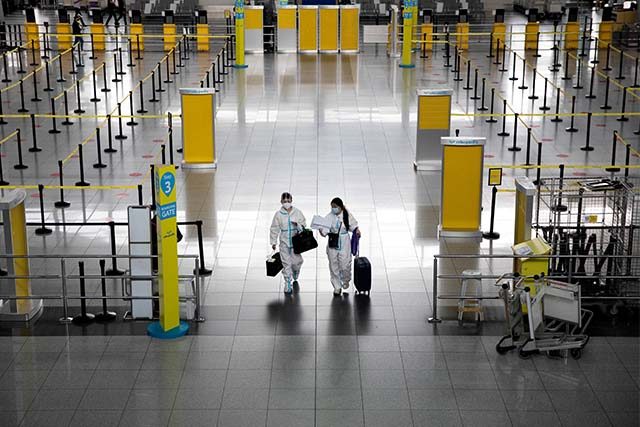
A former special adviser to the National Task Force Against COVID-19 said that travel restrictions on countries with the coronavirus variant from South Africa is a “preemptive measure.”
Dr. Tony Leachon said that while imposing a travel ban is the call of the Department of Health, he is “worried” about the possibility of the new variant entering the country.
“It’s DOH’s call. Just worried about entry of new South African strain given that most of government LGUs (local government units) ordered AZ (AstraZeneca) vaccine. It’s a preemptive measure,” he quote tweeted on Wednesday, responding to a report featuring DOH’s comment.
It’s DOH ‘s call.
Just worried about entry of new South African strain given that most of government LGUs ordered AZ vaccine. It’s a preemptive measure. https://t.co/Rd4dCjp6lH https://t.co/gnv3gkR2nu— Tony Leachon MD (@DrTonyLeachon) February 10, 2021
DOH Undersecretary Maria Rosario Vergeire said that they are not keen on imposing travel restrictions to countries with cases of the South African variant of COVID-19 for now.
“Right now, we do not see the need to restrict (our borders) to any countries with new variant. We have just lifted out travel ban,” she said at a Wednesday press briefing.
Last January, there were travel restrictions imposed on countries with the COVID-19 variant from the United Kingdom.
Vergeire added that the country “cannot remain to be in lockdown or restricted or isolated… forever” as “the virus is inter-zonal, inter-country.”
She said that the government has determined it is supposedly no longer rational to impose restrictions on the country’s borders.
Instead, there would be “more stringent protocols” when it comes to the quarantine, isolation and testing of the travelers.
Vergeire also mentioned the similar line in September last year, in response to the plan to reopen some tourist destinations in the country.
“Hindi naman po tayo puwedeng to remain in lockdown forever. We need to survive and we need to live with this virus, ang tinatawag nating new normal. So we just need to enforce these health standards that we have para lang masiguro po natin na hindi kakalat ang impeksiyon kung sakaling tayo ay magbukas ng ating mga sectors of society,” the DOH official was quoted as saying in September.
Meanwhile, Leachon last Monday reiterated that “border control is important.” He wondered if the Inter-Agency Task Force for the Management of Emerging Infectious Diseases (IATF-EID) would impose “travel ban” for those coming from South Africa.
Will the IATF impose travel ban for travelers coming from South Africa given that most PH 🇵🇭 LGUs have ordered Astra Zeneca vaccines for their residents.
Border control is important given AZ vaccine efficacy concern for this particular S. African variant( B.1.351 https://t.co/Nx2vtjZ6Kh— Tony Leachon MD (@DrTonyLeachon) February 8, 2021
There were other Filipinos who echoed Leachon’s concerns following DOH’s comment that it would not impose a travel ban to countries with the South African variant.
“Eto na naman tayo e,” a Facebook user commented in response to the report.
“Complacency again…” another online user wrote.
“Ipunin na lahat ng variant! Good job DOH!” a different Filipino commented sarcastically.
Last December, some lawmakers questioned Health Secretary Francisco Duque III‘s remark that the IATF is not yet recommending for a travel ban to countries with the COVID-19 variant from the United Kingdom at that time.
READ: ‘Lagi na lang late’: Duque hit anew for reluctance to impose travel ban amid new coronavirus variant
He was also initially hesitant to impose a travel ban on China in January 2020. A month later, the Philippines recorded its first death related to COVID-19.
South Africa, UK variant
The South African variant is reported to contain a mutation “believed to make the virus more contagious than older variants,” according to The Guardian.
“The South African variant also contains other mutations of concern, including E484K and K417N. These two mutations are thought to explain why the South African variant appears to be better able to evade neutralizing antibody responses by the body,” it added in its February 1 report.
However, experts said that there are still no indications the variant could result in a more severe disease.
South Africa recently paused part of its rollout of the AstraZeneca vaccine after a small trial showed that it did not protect against mild to moderate illness of COVID-19.
A panel of the World Health Organization said that the vaccine should still be deployed widely even with countries having the South African variant.
“We have made a recommendation that even if there is a reduction in the possibility of this vaccine having a full impact in its protection capacity, especially against severe disease, there is no reason not to recommend its use even in countries that have circulation of the variant,” Alejandro Cravioto, chair of the panel, said.
Meanwhile, the variant from the United Kingdom is more contagious than its viral predecessors.
Last month, UK experts said that it may be associated with an increased risk of death but more studies have to be done to confirm the findings, according to the United States’ Centers for Disease Control and Prevention.
The UK variant was first detected in the Philippines on January 13 from a Filipino who arrived from the United Arab Emirates.









